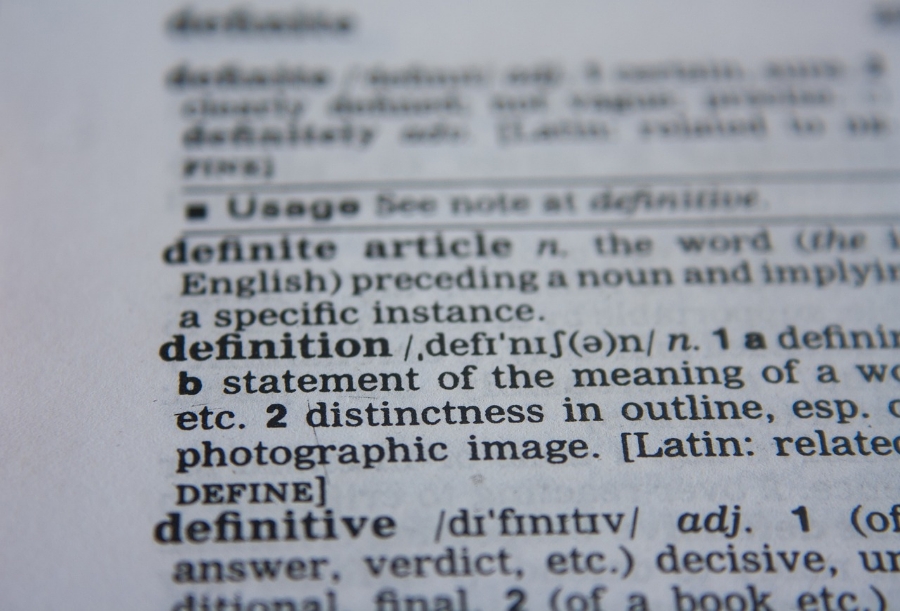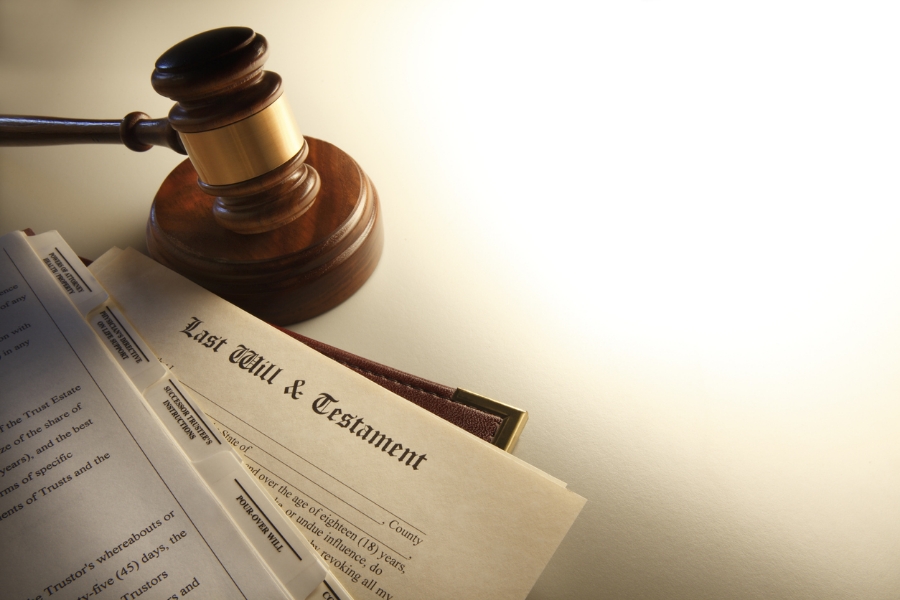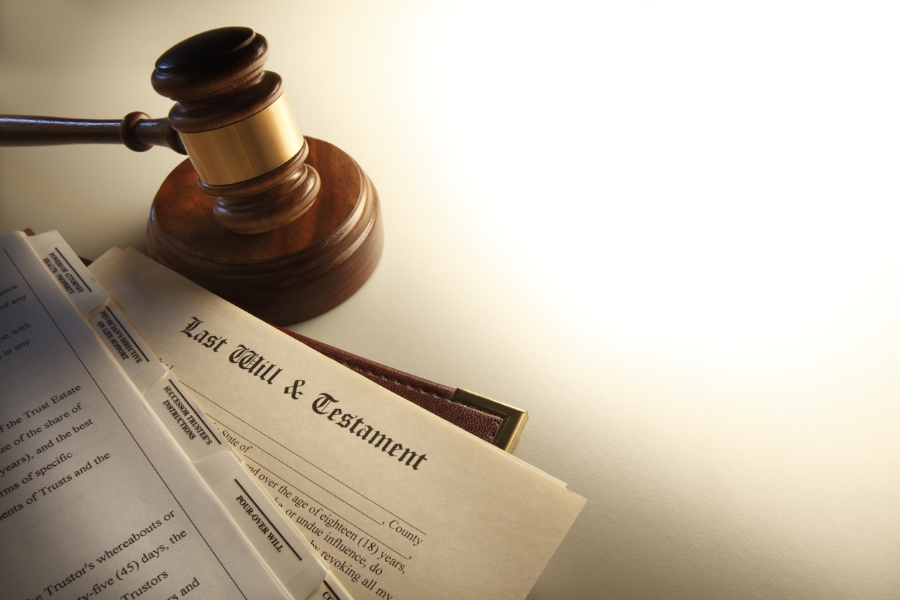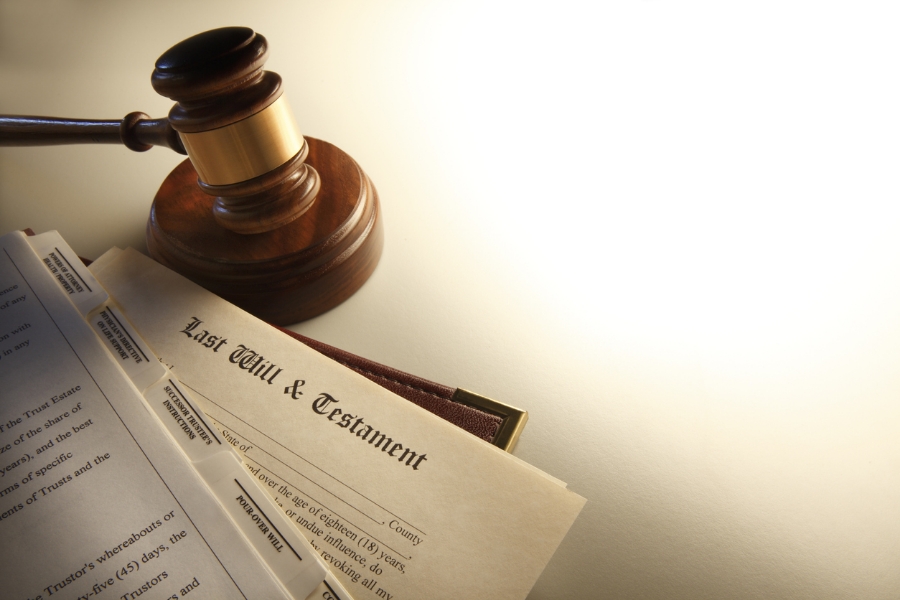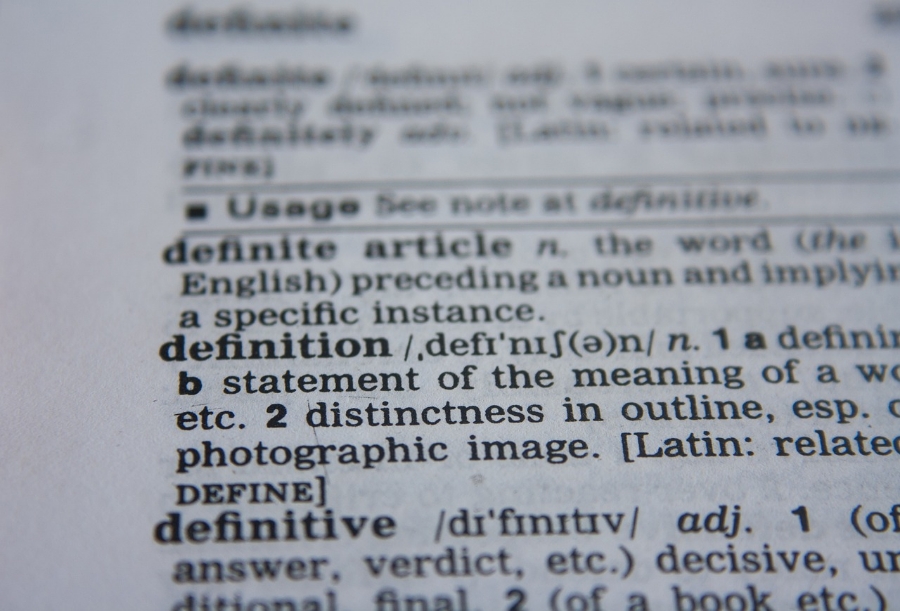Blog
Writing your Will can be a daunting prospect.
Not only do you have to decide who to leave your property to when you die and who will be the executor of your estate, but you have to wade through a lot of confusing legal terms. This brief Glossary explains some of the words and phrases commonly used in wills, as well as a few other terms that you may encounter during your estate planning process.
Administrator
An administrator is a person or firm that is appointed by the Court to manage and distribute the estate assets of a person who died without making a will, or of a person who died with a will but whose named executor is either unable or unwilling to act in that role.
Beneficiary
Anyone who benefits under your Will by receiving a gift of property or money is a beneficiary.
Bequest, Bequeath
A bequest is a specific gift of property or money to a specific beneficiary under a Will. To give a gift to someone under the terms of your Will is to bequeath that gift to them.
Codicil
A codicil is an addition or addendum to a Will, which has the effect of making a change to the Will without entirely replacing it. Codicils are typically used only to make minor changes, but since the requirements for witnesses are the same for a codicil as for a will they really have no advantage over just making a new will.
Decedent
A person who has died.
Devise
This term refers to the transfer of real estate property to a beneficiary through a Will.
Disinherit
To cut off a person from their inheritance in an estate where they would have been a natural heir. For instance, a child can be disinherited by a parent in the parent’s Will.
Estate
A testator's estate consists of ALL of the testator's assets and property, including cash, investments, real estate and personal possessions.
Executor
The person you have named in your Will who will be responsible for administering your estate is your executor (also called a personal representative or trustee). The executor is responsible for obtaining the grant of probate, collecting debts and other amounts owed to your estate, managing any testamentary trusts set up in your Will, filing the final income tax return, paying any estate taxes due, and making the final distribution of estate assets to the beneficiaries.
Guardian
An adult person appointed by you to care for your minor children, or, if the guardian is a property guardian, the person responsible for managing any estate property left to a minor child in your Will.
Heir / Inherit
An heir is a person who takes title to a deceased person's property by the laws of descent in cases where the deceased has no will. That is different from a beneficiary, who is bequeathed a gift in a decedent's will. When an heir takes or receives property through the legal right of succession in this manner, they are said to inherit the property.
Holographic will
A will that is handwritten, signed and dated totally in the handwriting of the testator is called a holographic will. Holographic wills are not recognized as legally valid in all places.
In specie
When estate assets are distributed to beneficiaries in their present form, that is a distribution in specie. The alternative would be for the executor to sell the assets and distribute the cash proceeds.
Issue
All persons who are descended from a common ancestor (for example one's children, grandchildren, and so on), either through birth or adoption.
Letters testamentary
A formal document issued by a probate judge giving a personal representative the authority to conduct business, enter contracts, sell estate property, pay bills, distribute estate property, and otherwise act on behalf of a decedent's estate.
No contest provision
This is a provision that you can add to your Will which provides that any beneficiary under the Will who makes a legal challenge to the validity of the document will be disinherited. You should review this with your legal advisors beforehand if you are considering adding such a provision.
Non-probate property
Any real or personal property which has been disposed of by a decedent by any means other than through a will, such as proceeds of life insurance policies, retirement plans, or property held in joint tenancy with right of survivorship.
Per capita
The method of dividing an estate by giving an equal share to each of a number of persons, all of whom stand in equal degree to the decedent.
Per stirpes
This is the most common way of distributing an estate such that if one of the decedent's children is dead, that person's children will share equally in his/her share of the estate distribution. This is also known as "by right of representation".
Probate property
Any estate property (real or personal) which has been left to beneficiaries under the testator's will, and which is managed by the executor prior to being distributed to the beneficiaries.
Probate
The legal process which facilitates the transfer of a deceased person's property, whether they have a will or die intestate (without a will). The court will establish the authenticity of the will, appoint a personal representative or administrator if necessary, identify heirs and creditors, direct the payment of debts and taxes, and oversee the distribution of the assets.
Testament
As in "last will and testament". The word simply means the written contents of your Will which consists of your instructions and wishes regarding the disposition of your estate.
Testamentary capacity
This refers to your legal ability to make a will, meaning that you are of legal age and of sound mind.
Testamentary trust
A trust that is created under a will and does not come into existence until after the testator's death. Testamentary trusts are the most common method of managing estate property on behalf of beneficiaries who are not of legal age.
Testator
The testator is the person making the will - in other words, you.
Trust
An arrangement under which assets are set aside by an individual and administered by a trustee for the benefit of another person.
Trustee
If you leave property or money in trust for minor children, the trustee is the person responsible to administer the trust until the conditions you have set (for instance, until the children reach a certain age) are met. The trustee has the authority to use trust funds for medical expenses, education costs, and other necessary expenses - basically the same authority as the parent would have if still alive.
You have been named as executor of a loved one's will. What does that entail?
You might feel honoured to be named the executor of a person’s estate. After all, it is an indication of the high regard and level of trust that the testator feels for you. However, it is a demanding, time consuming and often complicated role.
Acting as the executor of an estate involves dealing with all the legal, fiduciary and tax implications arising out of the person's death, as well as coping with the financial and emotional needs of beneficiaries. And if the deceased person is a loved one, the role becomes even more difficult because you will be dealing with your own grief and loss as well.
To aid you in properly carrying out the duties of an executor, we have put together a list of the duties that are most often required from an executor. But be aware that this list is not exhaustive. Other tasks may be required, depending upon (i) how complicated the deceased's estate is, (ii) where the property is located, and (iii) the marital and family status of the deceased (e.g., divorced, step-children, disabled dependents, etc).
10 things you will be required to do as an executor.
1. Find and read the will, and organize funeral arrangements. Locate the deceased's will and read it over to familiarize yourself with their wishes and instructions. As soon as possible after that, arrange a meeting of the deceased's immediate family (and, if appropriate, include close friends or business associates). The meeting should discuss funeral arrangements, and identify and locate important documents and items such as banking and tax records, stocks and other securities, insurance policies, safe deposit boxes, title deeds, etc.
2. Determine the location of all estate assets and property. Make a list of everything and ensure that all assets (real property, personal property and funds) are protected and sufficiently insured. If the deceased was a business owner and there is no one available to take over managing the daily operations, you will have to hire a qualified manager on an interim basis to manage the business during the estate administration period.
3. Probate the estate. You may need to consult a lawyer to help you through the process, depending on the complexity of the estate. Probate will not be necessary (i) if all estate assets are jointly owned with right of survivorship, (ii) if the estate assets are held in a trust, or (iii) in some jurisdictions, if the estate is considered a "small estate". Any assets that have named beneficiaries (such as life insurance or registered investments) bypass the estate and are not probated.
4. Advertise for creditors. This is essential if the deceased is the sole owner of a business. Place a notice in a local newspaper with the name of the deceased, date of death and your contact details, so that any creditors who have an interest in the estate assets have an opportunity to come forward and make a claim. If you fail to do this and a creditor turns up after all the money has been distributed, you will be responsible for paying the debt.
5. Transfer all of the deceased's property into your name. As the executor of the estate, you are entrusted with the power and authority to dispose of the estate assets. You will need to deal with financial institutions, brokers, transfer agents, and land titles offices to transfer title deeds into your name first, before you can distribute the assets to the beneficiaries. This ONLY applies to property that is not jointly held with rights of survivorship.
6. Arrange for payment of all of the estate's legally enforceable debts, including funeral and probate costs. All of the debts must be paid out or the funds allocated to pay such debts, before any distributions are made to beneficiaries.
7. Prepare the deceased's final tax return. If you are not familiar with the tax laws related to estates, you may want to consult an accountant for expert advice.
8. Create any trusts provided for in the deceased's Will. A trust is a legal arrangement that requires assets to be held by a Trustee for a specified period of time - typically this will be when a minor beneficiary reaches a certain age. The income may be paid out or accumulated for distribution to the beneficiaries once the trust conditions have been satisfied.
9. Arrange for payment of legacies and distribution of the estate residue to the beneficiaries. This cannot occur until all estate debts are paid but in general, if the estate is not overly complicated the distribution will usually occur within the first 12 months following the death of the testator.
10. Keep complete and accurate records of everything you do. You may be required to produce these records as evidence if anyone contests the will or questions your actions as an executor.
Image by Carolyn Booth from Pixabay
If you are about to make a Will for the first time, you may find that choosing an executor to administer your estate can be one of the most difficult - but possibly the most important - decision you will need to make with regards to your Will and estate planning.
Your executor (also called a "personal representative" or a "trustee") is the person you appoint to carry out the instructions in your Will, to distribute your property according to your directions, and to wrap up your estate after you die. You can name one person to act alone, or several people to act together in this role.
You also have the option to appoint a trust company or your lawyer to act as your executor, if you don't want to place that responsibility on a family member or friend. And make no mistake - it is a lot of responsibility and it's a task that can take years to accomplish.
What does an executor do?
The executor is responsible for dealing with all matters related to distributing and winding up your estate. The duties of an executor include such things as:
- Meeting with the deceased person's family, legal and accounting advisors, business associates, and other interested parties to discuss the provisions of the Will and to make funeral arrangements, if necessary.
- Arranging for probate of the will.
- Notifying banks, brokers, debtors and creditors of the estate.
- Finding and assembling all of the estate assets and property and determining their value.
- Filing life insurance, pension and death benefits claims.
- Reviewing all of the deceased's financial and tax records, including those for any business in which the deceased has a significant interest.
- Reviewing insurance policies, titles, leases, mortgages, and contracts relating to the estate assets or to which the deceased is a party.
- Collecting all income, receivables and debts owing to the deceased or the estate.
- Paying all outstanding debts and liabilities of the deceased or the estate.
- Estimating the amounts required for legacies, taxes, and other costs required to settle the estate and ensuring there are sufficient funds to pay them (including selling estate assets if and when necessary).
- Conducting any legal claims made by the estate and defending any lawsuits against the deceased or the estate, including settling any such claims.
- Preparing the final income tax return.
- Managing trusts for minors (if applicable).
- Distributing the estate assets to the beneficiaries.
Things to consider when deciding who to appoint as your executor
When you name someone close to you to act as the executor of your estate after your death, it's an indication of the high esteem and trust you have for that person. Certainly, you should appoint someone that you trust to manage the estate property and assets until they are all distributed according to your instructions in your Will. But you must also consider the fact that the role of an executor is a demanding, time consuming and often complicated one. It involves dealing with all the legal, fiduciary and tax implications of a death, as well as coping with the financial and emotional needs of the beneficiaries.
Choosing an executor who cannot handle all of these pressures may result in a delay in settling your estate, which in turn can result in higher fees and costs that can eat away at the estate funds. This will leave fewer assets for distribution to your beneficiaries.
Talk to the person about your plans, and find out if they are willing to act in that capacity. It is essential that you have their consent before you name them in your Will.
When choosing someone to act as your executor, consider the following questions:
- Does the person reside in a different province, or even in a different country? If so, the court may require that a bond be posted. If that is the case, the person chosen must be willing and able to post the bond or apply to have it waived.
- Are you setting up a trust for minor children or dependent adults in your Will? Your executor must be willing and able to administer that trust for some time, presumably until the children reach adulthood or the dependent adults pass away. If they cannot commit to that lengthy time frame, consider setting up the trust under a Trust Deed and appointing a trustee who is able to handle the long-term responsibility.
- Will your executor be emotionally capable of carrying out your wishes at the time of your death? This is a very important consideration if you plan to name your spouse, partner or an adult child as your executor, because they will be grieving your loss and assisting other friends or family members in coping with your death. The emotional stress they are experiencing must not detract from their ability to carry out their duties as your executor.
Alternative choices to provide future certainty
It is a good idea to name an alternate executor in case the person you name as your original executor is unwilling or unable to act when the time comes. Another option is to retain a trust company or a lawyer to administer your Will. They will perform all the required duties, including administration of trusts, for a fee.
If you have a family, then as a responsible parent you have probably already executed a Last Will and Testament because you want to protect and provide for your children's future well being. But you may not have realized how important it is to regularly review and update your Will.
How often should I review my Will?
As a general rule of thumb, it makes sense to review your Will with your lawyer every 3-4 years, or after any life-changing event (such as a marriage, divorce or the death of a spouse). If your lawyer does not have the original Will in their possession, you should take it with you to the meeting.
You can keep a digital copy on your laptop or device as a handy point of reference, but make sure it is stored in an encrypted location and properly secured with a password so that only you can view it. Your Will should not be publicly accessible, not even by family members. This may well be the most important document you have ever signed. Protect it from tampering.
Under what circumstances should I change my Will?
1. If your marital status changes. In some jurisdictions, a marriage or divorce will automatically void your Will but this is not universal. And if you live with a common law partner, they may or may not be deemed to be your spouse under the law. Talk to a lawyer to find out how matrimonial property laws in your area affect your estate plan.
2. If you want to add or remove beneficiaries. Let's say your family has grown - whether through a birth, adoption, or blending of two families. You will want to provide for the additional child(ren) in your Will. On the other hand, maybe you and your cousin Alfred have had a falling out and you no longer want to leave him your stamp collection.
3. If you have made additional investments or acquired additional major assets. Don't just assume that all of your assets will automatically be covered by your Will when you pass. Review the provisions of your mutual funds, retirement fund accounts, life insurance policies and other investments with your lawyer.
4. If you have sold assets. Make sure that any property or assets you have sold are not listed as specific bequests.
5. If a beneficiary dies. Review the survivorship provisions in your Will to make sure that if a beneficiary predeceases you, their share of your estate is redistributed to other beneficiaries.
6. If your executor dies or is no longer able to act. Your executor (also called the administrator or trustee) is the person who will handle the payment of estate bills and the distribution of estate assets to the beneficiaries. If he/she dies before you do or is no longer capable of handling the responsibilities of winding up your estate, you must appoint a replacement. If you don't do it, the courts will make the decision for you.
Do I have to rewrite my entire Will every time I want to make a change?
Minor changes, such as adding one or more bequests, can usually be accomplished by adding a codicil to your Will. Major changes should always be incorporated into a new Will which will revoke and replace the previous Will.
Image from istockphoto.com
The old saying goes that the only sure things in life are death and taxes. While almost everyone files their taxes every year, over half of North Americans have not addressed that other certainty, and continue to put off making a Will.
A growing number of U.S. states have enacted laws that allow a home owner to record a transfer on death deed (also called a beneficiary deed or a TOD) during their lifetime. This form of deed will transfer ownership of their property directly to the beneficiary (grantee) named in the deed when the owner (grantor) dies. This is a low-cost and trouble-free alternative to setting up a living trust in order to keep real estate property out of probate.
Would I still own my property if I file a TOD?
Yes. Because the transfer on death deed does not become effective until the grantor's death, the grantor still owns the property and can deal with it as he or she sees fit, including mortgaging, encumbrancing or selling it, or changing or revoking the TOD.
If the property is jointly owned, the last surviving owner can change or revoke the deed as they see fit. The beneficiary has no interest in the property, and therefore no say in what happens to the property, during the grantor's lifetime.
What is the benefit of recording a TOD?
A transfer on death deed keeps your real estate property out of probate after your death, which can reduce probate fees and speed up the process of distributing the estate assets. However, any applicable estate taxes will still be payable.
Do all states allow for recording a TOD?
No. Currently the states that allow for recordation of Transfer on Death Deeds or Beneficiary Deeds are: Alaska, Arizona, Arkansas, California, Colorado, District of Columbia, Hawaii, Illinois, Indiana, Kansas, Minnesota, Missouri, Mississippi, Montana, Nebraska, Nevada, New Mexico, North Dakota, Ohio, Oklahoma, Oregon, South Dakota, Texas, Utah, Virginia, Washington, West Virginia, Wisconsin and Wyoming.
Regulations, requirements and limitations differ from state to state, but in general the procedure is very similar. If you own property in any of these states, you can record a Transfer on Death Deed or Beneficiary Deed and reduce the probate costs to your estate after your death. However - as usual - you can't avoid the taxes.
Image by H. Cuthill
No one expects the unexpected.
Each day of our lives, we run the risk of being struck down by disease, illness or accident. Any one of us could find ourselves in a hospital bed, unable to speak and unaware of our surroundings, clinging to life but facing imminent death.
Yes, I know that's a really depressing way to jump into an article, but I'm trying to make a point. Being prepared is a good thing. We don't like to think about these things, but they do happen.
If you were in a serious car accident and were given little chance of survival, your family would be devastated. Would you not want to spare them as much pain and stress as possible? Of course you would. That's why you should make an Advance Medical Directive.
What is an advance directive?
An advance medical directive (also known as a health care power of attorney, personal directive, or living will) is a document which accomplishes two things.
Firstly, it lets you name someone you trust (such as your spouse, partner, sibling, or good friend) as your attorney-in-fact (also called an agent, surrogate or proxy) who is authorized to make medical decisions for you when you are unable to do so.
Secondly, it allows you to set out your wishes about the extent of medical care you want to receive if you are in a persistent vegetative state (coma) or if you are likely to die from an irreversible condition.
Why is an advance directive important?
The underlying principle of an advance directive is to allow you to exercise your right to decide whether or not you want your life to be prolonged by artificial means, and to instruct your caregivers how much or how little treatment you want them to administer. Because these instructions are written down at a time when you were still able to communicate them, your loved ones and healthcare providers can be sure of your wishes and let those wishes guide their decisions.
You should discuss your healthcare preferences with the person you name as your agent so that he or she knows the circumstances in which you would not want to be resuscitated or kept on life support, whether you would want pain relief or other medications to be administered, and even whether you wish to receive fluids or nutrition intravenously.
An advance directive only becomes effective if you are no longer able to make your own decisions.
If your medical condition is temporary, the directive will cease to be effective as soon as you regain mental capacity. Many states, provinces and countries now recognize the patient's right to refuse life-sustaining treatments and to die with dignity, although some jurisdictions have restrictions on certain decisions that a surrogate can make. For instance, generally your agent cannot make decisions involving abortion or sterilization.
Your spouse, your agent and your doctor should all have a copy of your advance directive. And if you decide to change or revoke your directive, make sure they each have a copy of the changes or the revocation as well.
Q. I've been researching what I need to know to do my Will and set up a Trust, and I'm getting confused by some of the materials I've been reading. I keep seeing separate references to "heirs" and "beneficiaries". Are they not the same thing? My son is the heir to my estate, isn't he? Doesn't that also make him the beneficiary?
A. That's an excellent question, and the answer is "No". Let's have a look at the difference between the two terms.
Definition of "beneficiary" and "heir"
A beneficiary is a person you name in your Will to receive all or a portion of your estate property, or a person designated in a Trust Deed to receive all or part of the trust property. They're called beneficiaries because they benefit from the terms of the Will or Trust.
Any person or organization can be a beneficiary - it's up to you to distribute your property among them as you see fit. Most people choose to distribute their estate among their family members and close friends. You may also wish to gift a certain amount to a charity, club, society or service organization that is important to you.
Your heirs, on the other hand, are determined by the laws of descent. An heir is someone who will inherit the property of a person (decedent) who dies intestate, i.e. without a valid Will. The laws of the jurisdiction in which the decedent's property lies will determine what the order of succession will be, but in general, the estate may go wholly or partially (i) firstly to any surviving spouse, (ii) then the decedent's children, (iii) if no surviving children, to the grandchildren, (iv) if no spouse or children / grandchildren, to the decedent's parents, and (v) if no surviving parents, the decedent's siblings.
If there are no surviving members of the immediate family, the inheritance may then pass to other blood relatives, such as aunts, uncles, cousins, nieces and nephews. All of this depends on the degree of family kinship and the applicable laws.
So as you can see, there is a very distinct difference between a beneficiary and an heir.
Summary
Beneficiaries are chosen by you when you make your Will or establish a Trust. You can name yourself as a beneficiary of a trust, in many cases. And gifts can be distributed to beneficiaries through a trust during your lifetime.
Heirs are determined by law in cases where the decedent has died without a Will. As long as you are alive, you have no heirs. They only become your heirs after you die.
- 1
- 2
- 2025
- 2024
- 2023
- 2021
- 2020
- 2019
- 2018
- 2017
- 2016
- 2014
- 2013
- 2012
- 2011

_900.jpeg)
